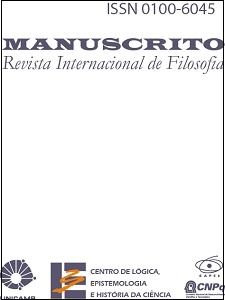Resumo
Nesse trabalho, pretendo poder mostrar que é um grave equívoco interpretarmos o papel das representações sensíveis na obra teórica de Kant como conteúdos não-conceituais (na acepção contemporânea técnica do termo “conteúdo” que, tais como dêiticos mentais, representariam o que aparece no espaço e no tempo de forma de re. A interpretação alternativa que me parece adequada é a seguinte: sem possuírem um conteúdo representacional próprio, a representação sensível deve ser entendida fundamentalmente como uma relação cognitiva entre o sujeito e as entidades objetivas no espaço e no tempo com as quais ele está contato epistêmico. Nos termos dessa relação, a referência imediata da intuição sensível ao seu respectivo objeto é entendida como uma forma de conhecimento por contato com tais entidades. Denomino a minha própria interpretação de relacionismo.
Abstract:
In this paper I intend to show that it’s a serious mistake to construe the role of sensible representation in Kant’s work as a nonconceptual content (on the contemporary and technical sense of “content”) which, like a mental indexical, would refer to what appears in space and time in the so-called de re form. The interpretation I advance and further support is this: without possessing a representational content, sensible representation must be understood as the basic epistemic relation between the subject and the physical entities in space and time she is acquainted with. Immediate reference of sensible intuition to their respective objects is to be understood as a form of knowledge by acquaintance . I call my own interpretation relacionalism.
Keywords: Intuition. Concept. Representational content. Nonconceptual contents.
Referências
ÍNDICE DE ABREVIAÇÕES UTILIZADAS DAS OBRAS DE KANT: AK = academia prussiana, edição de 1902. KrV = Crítica da razão pura (A = primeira edição, B = segunda edição).
KU = Crítica da faculdade de julgar (B= segunda edição). Prol = Prolegômenos a uma metafísica futura.
Anthr = Antropologia em sentido pragmático (Anthropologie in pragmatischer Hinsicht).
Logik (Wien) = Lógica de Viena.
Logik = Lógica de Jäsche.
LBI = Legado de Duisburg.
FSS = A falsa sutileza das quatro figuras silogísticas (Die falsche Spizfindigkeit der vier Syllogistischen Figuren).
Refl. = Kants handschriftliche Nachlass.
Diss.= Dissertação inaugural na filosofia teórica (De mundis sensibilis atque intelligibilis forma et principiis, 1770)
LITERARURA PRIMÁRIA:
KANT, I. Gesammelte Schriften. Editado pela Preussische. Akademie der Wissenschaften , Berlin, 1902.
KANT, I. Anthropologie in pragmatischer Hinsicht. Frankfurt am Main: Suhrkamp, Band XII, 1977.
KANT, I. Der Duisburgsche Nachlass and Kants Kriticism um 1775. Tübingen, 1910.
KANT, I. “Concerning the ultimate ground of the differentiation of directions in space”. Em: I. Kant’s Theoretical philosophy: 1755–1770 (pp. 365–372, Ak 2: 375–383) (D. Walford & R. Meerbote. Cambridge: Cambridge University Press, 1992.
KANT, I. Prolegomena zu einer jeden künftigen Metaphysik, die als Wissenchaft wird auftreten können. Berlin 1902.
KANT, I. Reflexionen. Berlin 1902. Citado de acordo com a edição da academia prussiana.
KANT, I. Logik. Berlin 1902. Lógica editada por J.B. Jäsche, nas Preleções de Lógica, 1800, citada de acordo com a edição da academia prussiana.
KANT, I Kritik der reinen Vernunf. Berlin 1902. Citada na primeira edição de 1781 (A) e segunda edição de 1787 (B).
KANT, I. Kritik der Urteilskraft. Berlin 1902. Citada na segunda edição de 1790 (B).
KANT, I. “Concerning the ultimate ground of the differentiation of directions in space”. Em: I. Kant’s Theoretical philosophy: 1755–1770 (pp. 365–372, Ak 2: 375–383) (D. Walford & R. Meerbote. Cambridge: Cambridge University Press, 1992.
LITERATURA SECUNDÁRIA: ALLISON, H. Kant’s Transcendental Idealism. An Interpretation and. Defense New Haven, Conn./London: Yale University Press, 2004.
BACH, K. Thought and Reference. Oxford: Oxford University Press, 1987.
(Revised with postscript 1994) ————. “Searle Against the World: How Can Experiences find their Objects?”. In: S. L. Tsohatzidis (ed.) (2007), pp. 64-78.
BREWER, B. Perception and Reason. Oxford: Oxford University Press, 1999.
BREWER, B. “Perception and Content”. The European Journal of Philosophy 14, pp. 165-81, 2006.
BREWER, B. “Perception and its Objects”. Philosophical Studies 132, pp. 87- 97, 2007.
BURGE, T. [1977]. “Belief De Re” with Postscript, in his Foundations of Mind. Oxford: Oxford University Press, pp. 44-81, 2007.
BREWER, B. “Vision and Intentional Content”. In: E. Le Pore and R. van Gulick (eds.) (1991), pp. 195–214.
BYRNE, A. “Intentionalism Defended”. The Philosophical Review 110, pp. 199-240, 2001.
BRUM TORRES, J. C. “Cognição intuitiva e pensamento de re”. Analytica, v. 4, n. 2, pp. 33-63, 1999.
CAMPBELL, J. Reference and Consciousness. Oxford: Clarendon Press, 2002.
CRANE, T. “Intentionality as the Mark of the Mental”. In: A. O’Hear (ed.) (1998), pp. 229-51.
CRANE, T. “Is there a Perceptual Relation?”. In: T. Gendler and J. Hawthorne (eds.) (2006), pp. 126-46.
DAVIES, M. “Perceptual Content and Local Supervenience”. Proceedings of the Aristotelian Society, 92, pp. 21-45, 1992.
GENDLER, T., HAWTHORNE, J. (eds.). Perceptual Experience. Oxford: Clarendon Press, 2006.
GRICE, H. P. “The Causal Theory of Perception”. Proceedings of the Aristotelian Society 35, pp. 121-68, 1961.
HANNA, R. “Kantian nonconceptualism”. Philosophical Studies, v. 137, n. 1, pp. 41-64, 2008.
LEPORE, E., VAN GULICK, R. (eds.). John Searle and His Critics. Oxford: Blackwell, 1991.
MCDOWELL, J. “Criteria, Defeasibility, and Knowledge”. Proceedings of the British Academy 68, pp. 455-79, 1982.
MCDOWELL, J. “De Re Senses”. The Philosophical Quarterly 34, pp. 283-94, 1984.
O’HEAR, A. (ed.). Contemporary Issues in the Philosophy of Mind. Cambridge: Cambridge University Press, 1998.
PEACOCKE, C. “Demonstrative Thought and Psychological Explanation”. Synthese 49, pp. 187-217, 1981.
PEACOCKE, C. A Study of Concepts. Cambridge, Mass.: MIT Press, 1992.
PEACOCKE, C. “Nonconceptual Content: Kinds, Rationales and Relations”. Mind and Language 9, pp. 419-30, 1994 RECANATI, F. Direct Reference: From Language to Thought. London: Blackwell, 1993.
STRAWSON, P. F. The Bounds of Sense. London: Methuen, 1966.
TSOHATZIDIS, S. L. (ed.). John Searle’s Philosophy of Language. Cambridge: Cambridge University Press, 2007.
TYE, M. Consciousness Revisited. Cambridge, Mass: MIT Press, 2009.

